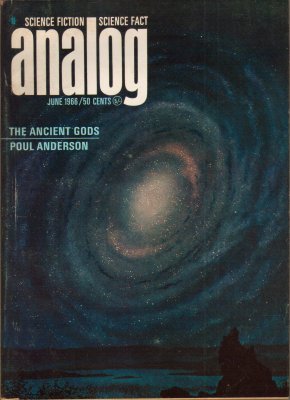
(Cover Chelsey Bonestell)
Analog - Jun 1966
Letter
Analog Brass Tacks Section
Dear John:
Your editorials continue to bit the nail right on the thumb. This was especially so in the case of "The Nature of Literature" in your October issue, reviving as it did a knockdown-and-drag-em-out row between the everloving and myself on that very subject. The quarrel arose over a book from the library which said ever-loving insisted that I must read. Said book was by a certain French man of letters, a darling of the academicians and, according to the blurb on the jacket, his first novel for twenty years. I tried to read the precious work, and was irked almost at once by some quite unnecessary and dreadfully amateurish incursions into fantasy. I flung the volume from me in disgust and said that I was only a common working stiff, but that if I took twenty years to write a novel it would be good. I added a few well chosen words on the subject of intellectual snobs and long-haired critics, and when Susan began a spirited defense of the highbrow writer and his reviewers I said that only a craftsman was qualified to judge craftsmanship, and that the craftsmanship which had aroused my ire was too shoddy to be tolerated in any of the American pulp magazines. And so on, and so on.
Your editorial, however, recalled to mind more than the above mentioned fight. It caused me to remember a friend in England, a schoolmaster with a degree in Arts - from one of the Universities where Art is Art and Science is Science and never the twain shall meet - whose subject was English Literature. This friend, who was qualified to teach English Literature, used to come to me, qualified only as a Master Mariner, for advice on recommended reading of Twentieth Century authors. Furthermore, his only published work was a piece of verse in a very minor magazine, while I already had quite a few short stories to my credit.
All in all, however, I do not think that any college could possibly train students to become successful authors. The modern writer must go out into the world to make his living as well as he is able, gaining the experience and meeting the characters that he will use-in his stories. After all, Bill Shakespeare had knocked around more than somewhat before he laid quill to paper - as an actor, as an actor-manager and - as some claim, and there seems to be evidence to support the theory - as a crew member of vessels trading to the Mediterranean And I need hardly mention one of the greatest novelists of them all - Conrad.
A. BERTRAM CHANDLER
I understand Homer knocked around a bit, too...